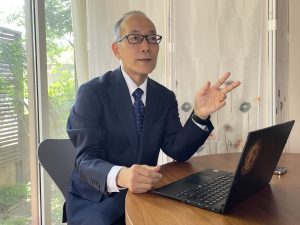

Prof. SAKAI, Tetsuya
Doctor of Engineering
The name “Computer Science and Engineering” covers both information science and information engineering, but is roughly equivalent to what is known internationally as “Computer Science.” It is a discipline for creating computers themselves, building advanced functionalities through cumulation of basic computer operations, and acquiring skills for putting ideas into pactice. We aim to cultivate computer scientists who can make a difference on a global scale.
Students assigned to the Department of Computer Science and Engineering (CS department for short) as sophomores begin by learning the foundational theories of computer science. While programming is also part of the curriculum, there’s no need to worry as many students have little to no prior programming experience at this stage. As juniors, they study more advanced theories and applications. For instance, I teach a database course in the fall semester of the third year, which covers both theory (such as relational algebra, a type of mathematics) and application (including the syntax of the SQL programming language). In their fourth year, students are assigned to research labs and start researching for their graduation theses.
The CS department has a sibling called the Department of Communications and Computer Engineering (CE department), and the two departments form a single major at the graduate level. Students in the CS department have the opportunity to learn about communication fields as well. Additionally, for students entering graduate school through recommendation, it’s possible to request placement in one of the CE department labs instead of a CS lab. However, what’s important for such students is which particular lab they will join rather than whether the lab is a CS lab or a CE lab. This is because each lab has its own field and characteristics, which depend heavily on the supervising professor. Please try visiting our labs’ websites and you will probably see what I mean.
The CS department aims to cultivate computer scientists who can make global impact, but the actual career paths of our graduates are quite diverse. Those who are good at coding may aspire to start their own businesses even before graduating, and some have indeed gone on to achieve great success in entrepreneurship. While the mainstream path is research and development roles in IT companies, some enter trading companies, pursue careers in public service, and explore various other avenues. The majority of the CS students continue to pursue master’s degrees through recommendation, but others take graduate school entrance exams or study abroad at foreign universities. Some students opt for an overseas study experience before returning to Japan to complete their graduation theses with renewed vigor.
Since our faculty also run an English-based degree program (CSCE Major) addressing fields equivalent to the Japanese CS and CE courses, our Japanese-course students have frequent interactions with students from oveaseas, especially after joining a research lab in their fourth year. For example, in my lab, more than half of the students are from overseas. I believe that this rich environment serves as a stepping stone for students who will later thrive on a global scale.
I am conducting research in information retrieval, natural language processing, human-computer interaction, and social good. Information retrieval is about effectively providing relevant information to users. Natural language processing is about enabling machines to handle human languages effectively. Human-computer interaction is about interaction between humans and machines. Furthermore, social good is about improving society, which is more of a research goal than a research discipline, and often utilises the above three disciplines possibly along with others.
With the advent of large language models, we are witnessing conversational systems that look somewhat intelligent. However, in order to turn such systems into something really “good,” I believe it is necessary to make full use of all of the above technologies. I have spent the past decades on developing methodologies for evaluating how “good” a system is, particularly from the perspective of whether the system is truly effective for users, and to what extent.
Researchers are not mad scientists often depicted in movies. We should try to make use of technology to make the world a better place. For example, we should prevent conversational systems powered by large language models from generating harmful remarks (e.g., those containing lies or biases). We should address inequalities between those who can effectively utilize such systems and those who cannot. Moreover, systems involving large language models or other massive computations emit CO2 and consume water to accelerate global warming. Thus, I believe researchers should always think about the possible consequences of their work from diverse perspectives, and do something about them in a timely manner.
To smoothly acquire the expertise offered in the CS department, foundational knowledge such as mathematics is crucial. I understand that it might be difficult for high school students to see how subjects like mathematics will help them. However, once they start studying at university, they are likely to start appreciating their importance: “Oh, so THAT’S how the subject helps us build these systems!” “Oh, so THAT’S how it helps us conduct these experiments!” If you have some time to spare, trying out some programming will not hurt, but studying the foundational subjects comes first! I know life as a student preparing for university entrance exams can be challenging, but please do try to stay healthy physically and mentally, while also looking out for people around you. Make the most of your time.
I wrote “rich and fair” in the above headline. We want to create a society that embraces everyone, not just a privileged few. Computer Science can serve as one approach towards this goal. Let’s cultivate not only academic prowess but also the ability to put yourself in someone else’s shoes. Truly intelligent individuals possess both of these qualities. If such people can collaborate, making the world a better place than it is today should not be to too difficult!